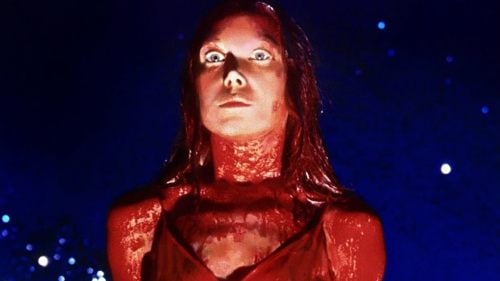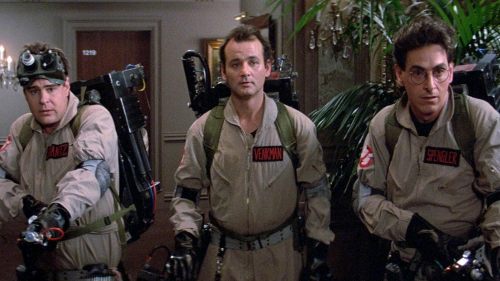Collins’ Crypt: Revisiting Brian De Palma’s SISTERS
For whatever reason, my first exposure to a filmmaker's output tends to be an odd choice. My first Wes Craven movie was Deadly Friend, The Rookie proved to be my introduction to Clint Eastwood, and somehow, I managed to see Jack before The Godfather or anything else Francis Ford Coppola ever made. But my favorite example has to be Brian De Palma, because I started with the one famously seen by no one: The Bonfire of the Vanities. I was 11, and it was something my parents rented and I wanted to watch because it had "the guy from Die Hard in it". Odder still, I remember liking it at the time; I don't recall much of that single viewing and when I read a plot synopsis I can't imagine what younger me found appealing about it, but it was enough to get me interested in Raising Cain and Carlito's Way later. So, thanks, Bonfire! You had some use, after all!
Hilariously, the one thing I DO remember is my mother saying "this has all been one shot" about Bruce Willis' four and a half minute swagger into the World Trade Center, making me aware of the technique for the first time even if I didn't think much of it then (I probably thought it was easy enough to do, since my dad's home movies of us at the beach or whatever contained shots that went on much, much... much longer. The man never learned to pause, I guess). The director's name would continue to pique my curiosity as I got older - seeing Mission: Impossible, Snake Eyes, and even Mission to Mars all on their respective opening weekends, and naturally I caught Carrie somewhere in there as I became a fan of Stephen King. But despite my interest in such fare, I never got around to seeing his '70s and '80s thrillers until I was well into my twenties (and there's still a big one I haven't seen, let's see if you can figure it out by the end of this article!); when Femme Fatale came out in 2002 it was said to be his "return" to a genre I didn't associate with him at all! Plus I was seeing them all out of order, denying myself the thrill of watching him grow as a skilled filmmaker throughout this period.
Anyway, it was around 2009 when I finally caught Sisters. The film concerns a reporter named Grace (Jennifer Salt) who looks out of her window and sees a murder in progress in the apartment across the way. She calls the cops and demands they come quickly (hopefully in time to stop the guy from dying), but as she wrote an article about police brutality in the past, they're in no rush to help her. Worse, by the time they get to the apartment the murderer (Margot Kidder) and her ex husband (De Palma regular William Finley) have already cleaned everything up and hidden the body inside the fold out couch, making her story even harder for the police to believe. So she hires a detective (a hilarious Charles Durning) and sets about trying to prove the murder really happened, uncovering Kidder's secret past in the process.

Of course, any time you mention De Palma to anyone in the know someone will bring up Alfred Hitchcock, and this movie is no exception - just the part of the plot that I described is essentially a combination of Rope (a body hidden right under the noses of people who are looking for it), Psycho (the murder is of someone more or less introduced as the film's lead), and Rear Window (duh). But it's also got some touches of Polanski, and the film opens on a game show called "Peeping Toms", a direct tip of the hat to Michael Powell's 1960 film, which concerned voyeurism of a different kind and was referenced in some of his other films as well. So it basically seems like a standard De Palma thriller, just as Deep Red feels like a greatest hits of Argento's gialli output. But here's the thing: while Deep Red was Argento's fourth such film, with all the kinks worked out, Sisters was actually the first of De Palma's thrillers, a fact that escaped me until it was pointed out in the booklet that accompanied the new Criterion Blu-ray.
I know this might sound dumb of me, but again, I was watching them out of order, and as there are still some holes I need to fill I just assumed something so assured was the work of someone who had already made a couple of them I just hadn't seen yet. And that's a bummer in some respects, because if you watch it knowing only of his earlier work (comedies, mostly), you'd be shocked by the murder scene when it occurs, nearly a half hour into the film. By the time I saw it, I knew it was not just a thriller, but a "De Palma thriller" having seen the masterful likes of Blow Out and Dressed to Kill, so I was not only expecting it, I was kind of impatiently waiting for it my first time around, unaware it was his first attempt at such a thing. Of course, since it was an homage to Psycho it had to be "delayed" in order for it to work on the audience who was expecting this character to be the film's hero, and in some ways it's actually more of a shock if you're unaware since Sisters isn't an iconic pop culture reference the way the shower scene in Psycho is. I can't imagine anyone is able to be blown away by Janet Leigh's murder in that movie anymore as they would have known about her shock death through cultural osmosis, but ______ in Sisters? It's probably a good jolt, especially if you manage to catch it early in your De Palma crash course.
Now that I'm a bit smarter, at least in terms of the chronology of his directorial output, I actually had even more fun with the film watching a second time on the new Blu-ray (which also sports a new transfer that's leaps and bounds better than their older one, even beyond the obvious improvement from standard to high-def). For starters, it's amusing to see the filmmaker still working the shaggy comedy stuff out of his system - there's a scene where Grace is endlessly needled by her mother over her lack of a husband and chosen profession, and it comes off like something out of the most generic rom-com ever filmed. Most of Durning's performance (who spends most of the movie tracking a body no one is looking for) is hilarious as well, right down to the film's final shot, where he's keeping an eye on a couch (where the victim is entombed) and thinks he's caught a break only to discover that the person showing up is not the murderer but a farmer tracking a lost cow. Not that De Palma's other thrillers lack humor when appropriate, but I can't recall any of them flat out ending on a laugh.

It was also the first time I saw it since watching the unfortunate remake from 2006, which sat on a shelf for a bit until being dumped to DVD in 2008 (at least, here in the US). That film's strong cast (Chloë Sevigny was cast in Salt's reporter role, and Stephen Rea stepped in for William Finley) did not help its muddled revisions to the same basic story and lack of any real visual flair. Even with the low budget (and his relative inexperience), BDP still gave his Sisters a glorious split-screen sequence, in which we watch Salt and two cops make their way up to the murder scene on one side of the frame, while Finley and Kidder clean up that same scene on the other, culminating on the characters meeting face to face at Kidder's front door. It's a nifty and memorable sequence that now, twenty-plus films later, probably wouldn't even make some "Top 10 De Palma Sequences" lists as he's only gotten more inventive (and, usually, more money to play with), but the remake didn't even try to do anything you'd remember ten minutes later. In fact, throughout the remake I kept noting that the quirky things that gave the original its flavor were excised or changed drastically, giving the update no personality at all - leaving only the hazy story. This remains the only instance of someone remaking De Palma (except for Carrie, which is a gray area given that it's an adaptation), and will hopefully remain the last.
That said, it's a shame they didn't wait another decade or so and try to remake the film now, given the film's themes of women not being believed and being manipulated by the more powerful men around them. Watching now, it makes the film's conclusion seem more cynical than ever, and it'd be interesting to see someone take a cue from Tom Savini's Night of the Living Dead remake and start off doing the same thing, but detour and let the women come out on top (for those who haven't seen that 1990 remake, Barbara doesn't spend the film nearly catatonic as she did in the original - she ultimately takes charge and survives the night, kicking much zombie ass along the way). Then again, with De Palma said to be making a horror film (!) directly inspired by the likes of Harvey Weinstein's downfall, why settle for a remake when we can get an original from the guy who'll probably make the better movie, anyway?
Some of the film's aspects might be a bit touchy now (Kidder's role as someone with severe mental issues is unfortunately portentous, especially given her recent and relatively early death), and while it's quite good he'd refine the "formula" with later and mostly better films, but it's still very much worth your time. The Criterion stamp of approval should increase its visibility among fellow casual fans like me, and the bonus features make it worth the cost (there's a Q&A presented as a commentary that proves audiences asked stupid questions even back in 1973!). Maybe not his best film, but it's an essential part of his filmography all the same, and a good place to start if you've somehow never managed to see one of his movies. Certainly a better place than Bonfire of the Vanities, anyway.



